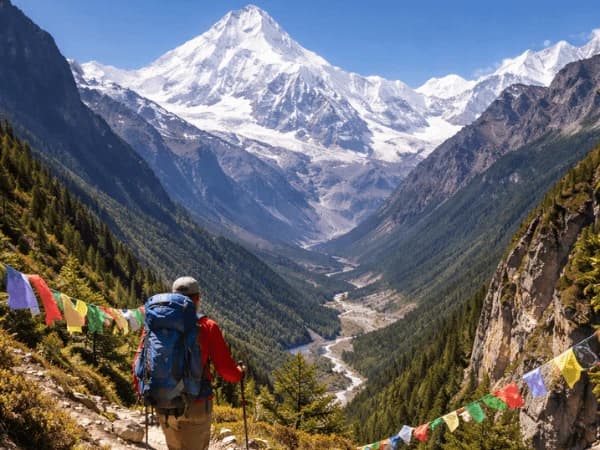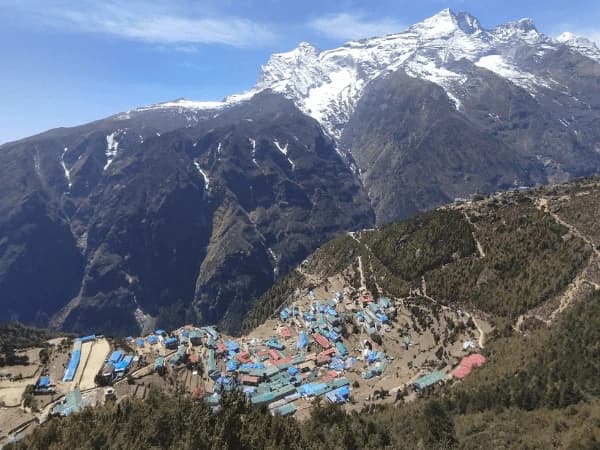Everest Base Camp Trek Preparation and Training Tips
The Everest Base Camp (EBC) Trek is one of the most iconic and rewarding trekking adventures in the world. However, to reach the base of the highest peak in the world is not a walk in the park. Good preparation and training are equally necessary. So, a big question in trekkers' minds is how to train for the Everest Base Camp Trek.
Located in the heart of Nepal's Khumbu region, this high-altitude journey takes you through breathtaking landscapes, Sherpa villages, and ancient monasteries, culminating at the base of Mount Everest (8,848.86m). That being said, trekking at high altitude requires excellent determination and commitment to enjoy every footstep into the Himalayas. Trekking above 5000 meters is challenging and requires proper preparation and training. The trek does not require technical skills, but the high-altitude terrain demands good physical fitness, endurance, and mental preparedness for an enjoyable experience at Everest Base Camp.
In this blog, we thoroughly explore how to train for the Everest Base Camp Trek, covering physical conditioning, mental preparedness, altitude adjustment strategies, and fitness advice.
Physical Preparation for EBC Trek
The Everest Base Camp Trek is one of the most demanding hikes in the Everest region, requiring a certain level of physical fitness and endurance. The route mostly stays above 3,000 meters and includes multiple days walking over 5,000 meters, making altitude one of the biggest challenges of the Everest Base Camp Trek. Whether you're an experienced trekker or a beginner, such a trail demands proper preparation, strength, and stamina. Maintaining good physical fitness is essential for these physically demanding and high-altitude treks in Nepal. Taking part in lifting weights, hiking, jogging, and strength training falls under the physical training for the Everest Base Camp Trek. Physical strength helps you push the extra mile along the journey. Moreover, walking at high altitude every day, averaging around 5-6 hours, is tough. With strong physical stamina and strength, you can easily commit to this trek without any difficulties. Moreover, those who want to undertake the 10-day Everest Base Camp Trek require more physical strength than those who follow the regular 14-day Everest Base Camp Trek.
Why training is essential for the Everest Base Camp Trek
The EBC Trek typically lasts around 12-14 days, covering a distance of 130 miles with daily walks of 5-8 hours. Though non-technical, it features steep ascents and trails above 5000 meters on rough, uneven terrain. The journey to Everest Base Camp at 5,364 m and Kala Patthar at 5,545 m is especially demanding. Proper advanced training and preparation are vital for effectively managing these challenges.
Training is crucial for the Everest Base Camp Trek to ensure:
Better acclimatization
Getting your body used to higher altitudes is key during the Everest Base Camp Trek. Therefore, advanced training and planning are necessary, as a well-trained body adjusts more efficiently to higher elevations, reducing the risk of altitude sickness.
Builds endurance and stamina
Training before your trek helps you develop endurance and stamina. Similarly, training is vital to handle the daily walks of 5-7 hours at high altitude during the EBC Trek.
Reduce the risk of injuries or exhaustion.
Regular exercise boosts physical resilience by helping your body recover quickly from daily stresses and lowering the chances of sprains or overuse injuries. Hence, engaging in advanced training before the trek can decrease the likelihood of injuries and fatigue.
Increase confidence
Being physically fit and trained before starting any trek boosts your confidence. This increased confidence can greatly improve your overall experience and enjoyment during the journey, making each step easier and more rewarding.
Altitude and acclimatization tips for EBC Trek
Most of the Everest Base Camp Trek route is above 3,000 meters, reaching over 5,000 meters, where altitude sickness and other health issues are common. In such cases, acclimatization is crucial. One of the most effective tips for acclimatization is the hiking slowly and gradually method, which allows your body to adapt gradually. Similarly, here are some tips to manage altitude-related problems:
Hike high, sleep low.
This is the golden rule to follow while trekking at high altitudes. Hiking to higher altitudes and sleeping at a lower altitude helps your body to adjust gradually to the altitudes, minimizing the risk of altitude-related problems. Likewise, during your EBC trek, follow this rule to adapt your body to the higher altitudes.
Take proper acclimatization days.
Proper acclimatization days are necessary while trekking to Everest Base Camp. Usually, the Everest Base Camp trek includes the rest days at Namche Bazaar (3,440 m) and Dingboche (4,410 m). These acclimatization days allow your body to adapt to the altitude before ascending further to Everest Base Camp (5,364 m) and Kala Patthar (5,545 m).
Stay hydrated
Staying hydrated during the trek is a crucial tip for managing altitude issues. Drink at least 3-4 litres of water daily. Dehydration increases the chances of Acute Mountain Sickness (AMS).
Ascend gradually without rushing.
While trekking above 3000 meters, always ascend gradually without rushing. Avoid gaining a lot of elevation in a short period. Gaining 500 to 800 meters in a day is ideal for helping your body adjust to higher altitudes.
Avoid Alcohol and smoking.
Drinking Alcohol and smoking at higher altitudes can cause altitude-related issues. They dehydrate you and decrease oxygen absorption, which can harm your health. Therefore, it is best to avoid Alcohol and smoking in the higher altitudes of the Everest Region.
Mental Preparation to Train for the Everest Base Camp Trek
Mental preparation is just as necessary as Physical preparation for completing the Everest Base Camp Trek successfully. The trek includes long days of walking across rugged terrain, unpredictable weather, high altitude, and limited comforts, which will challenge your patience and determination. Develop the right mindset by staying focused, positive, and resilient in such situations.
Mental preparation includes setting realistic expectations, staying motivated during difficult sections, and embracing the unpredictability of trekking in the Himalayas. Practicing mindfulness, deep breathing, and visualization techniques can help you stay calm and composed when challenges arise. Yoga and meditation before and during the trek help you mentally. These are some of the steps to choose for your Everest Base Camp Trek training and preparation.
EBC Trek is as much a mental challenge as it is a physical one. Those who are mentally prepared are more likely to push through challenging moments and reach base camp with confidence and pride.
When to Start Preparing for the Everest Base Camp Trek
Proper planning and preparation in advance are essential for a successful Everest Base Camp Trek. Start your preparation 8 to 12 weeks before your trek to ensure a safe and enjoyable Everest journey.
Preparation in advance allows your body to gradually develop the stamina, strength, and cardiovascular fitness needed for high-altitude trekking. During the first four weeks, establish a consistent fitness routine that includes aerobic activities such as hiking, walking, jogging, or cycling. In weeks 5 to 8, increase the difficulty by adding elevation gains to your hikes, stair climbing, and leg and core strengthening exercises.
The last 2 to 4 weeks should focus on longer endurance hikes, practicing with your daypack to mimic real conditions. This period also includes mental readiness, hydration habits, and gear testing. Starting early enhances your physical preparedness, helps your body adapt gradually, and lowers the risk of injury or altitude sickness. Proper planning is essential for a successful Everest Base Camp trek.
Other Essential Tips for the Preparation of the Everest Base Camp Trek
- Always choose the best trekking company in Nepal, like Overland Trek Nepal, for proper planning, preparation, and training.
- Engage in walking and hiking regularly before departing for the trek.
- Do not rush while doing your workout. It can lead to injury if you do not follow the guidelines of the workout.
- During the trek, walk slowly & gradually to acclimatize yourself.
- Moreover, every day before the hike and after completing the hike, stretch your muscles to relax them.
- A good investment in trekking gear is so crucial. Get detailed information on Trekking Gear for Nepal from our travel guide.
- Pick the best time to trek to Everest Base Camp.
Best Short Treks in Nepal to Prepare for Everest Base Camp
If you're planning to trek to Everest Base Camp but want to gain experience beforehand, Nepal offers several short and beginner-friendly treks that are ideal warm-ups. These short treks help you build endurance, test your gear, and understand how your body reacts to higher elevations.
The Ghorepani Poon Hill trek,Gosaikunda Lake Trek, Langtang Valley Trek, and Mardi Himal Trek are among Nepal's short treks that are ideal for beginners preparing for the Everest Base Camp trek. These journeys typically last 4-7 days and offer stunning views at approximately 4,000 meters in altitude.
FAQs
Can a beginner do the Everest Base Camp Trek?
Everest Base Camp Trek is doable for beginners if you prepare in advance, both physically and mentally. First-time trekkers can complete the EBC Trek with proper preparation, acclimatization, and during the right trekking season.
How challenging is the trek to Everest Base Camp?
Trekking to Everest Base Camp is moderately challenging, as it involves trekking routes above 5,000 meters, which require proper preparation and acclimatization.
Is altitude training necessary before the trek?
It’s not mandatory, but focusing on aerobic and strength training is essential before the trek. Primarily, focus on getting proper rest and acclimatizing your body to the surroundings during the trek.
How hard is it to breathe at Everest Base Camp?
Everest Base Camp is situated at 5364 meters above sea level, where the air becomes thinner and oxygen levels drop by about 50% compared to sea level. This makes breathing difficult at Everest Base Camp, so it’s advisable not to stay there for extended periods.
What is the hardest part of the Everest Base Camp Trek?
The most challenging aspect of the Everest Base Camp Trek is the altitude, as most of the trail lies above 4,000 m. It also takes you to the highest point at Kala Patthar (5,545 m) and Everest Base Camp (5,364 m), where there is a high chance of altitude sickness.
What kind of exercises should I include in my training for the EBC Trek?
Before embarking on the EBC Trek, include the exercises such as cardio, strength training, flexibility training, and hiking.
Conclusion
Everest Base Camp Trek preparation is not just about physical preparation, but also about mentally preparing to face the challenges on the mountain. Train for 8-12 weeks before taking on the EBC Trek. Focus on the proper workout, including cardio, strength training, building endurance, and maintaining a focused mindset to complete the trekking journey to the foot of the World's highest mountain,Mount Everest (8848.86m). The trek demands both physical and mental strength, but is rewarded with the beautiful natural scenery and a unique experience of Sherpa culture and hospitality in the Himalayas.
We hope you got all the answers you need on how to train for the Everest Base Camp Trek. Now, it is time to lace your boots and start preparing for this journey to Everest. Need more assistance for the preparation of the EBC Trek? Feel free to contact us via email or WhatsApp us at +9779841920870.




